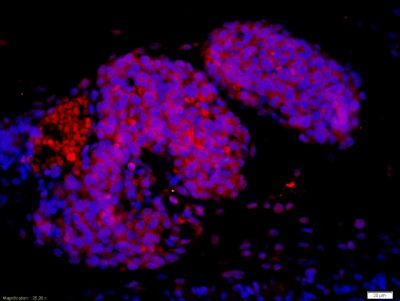英文名称: Anti-MKS1 antibody
MKS1,梅克尔-格鲁伯综合征相关蛋白抗体
产品编号HZ-11513R
英文名称MKS1
中文名称梅克尔-格鲁伯综合征相关蛋白抗体
别 名MES; B8d3; BBS13; Dysencephalia splanchnocystica; FABB proteome like protein; FLJ20345; Gruber syndrome; Meckel gruber syndrome; Meckel gruber syndrome type 1; Meckel syndrome; Meckel syndrome type 1; Meckel syndrome type 1 protein; Meckel syndrome type 1 protein homolog; MKS 1; MKS; MKS1; POC12; POC12 centriolar protein homolog.
说 明 书0.1ml 0.2ml
研究领域细胞生物 结合蛋白
抗体来源Rabbit
克隆类型Polyclonal
交叉反应 Human, Mouse, Rat, Dog, Pig, Cow, Horse, Sheep,
MKS1,梅克尔-格鲁伯综合征相关蛋白抗体产品应用WB=1:100-500 ELISA=1:500-1000 IHC-P=1:100-500 IHC-F=1:100-500 ICC=1:100-500 IF=1:100-500 (石蜡切片需做抗原修复)
not yet tested in other applications.
optimal dilutions/concentrations should be determined by the end user.
分 子 量64kDa
细胞定位细胞浆
性 状Lyophilized or Liquid
浓 度1mg/1ml
免 疫 原KLH conjugated synthetic peptide derived from human MKS1
亚 型IgG
纯化方法affinity purified by Protein A
储 存 液0.01M TBS(pH7.4) with 1% BSA, 0.03% Proclin300 and 50% Glycerol.
保存条件Store at -20 °C for one year. Avoid repeated freeze/thaw cycles. The lyophilized antibody is stable at room temperature for at least one month and for greater than a year when kept at -20°C. When reconstituted in sterile pH 7.4 0.01M PBS or diluent of antibody the antibody is stable for at least two weeks at 2-4 °C.
MKS1,梅克尔-格鲁伯综合征相关蛋白抗体PubMedPubMed
产品介绍background:
MKS1 is involved in centrosome migration to the apical cell surface during early ciliogenesis. It is required for ciliary structure and function, including a role in regulating length and appropriate number through modulating centrosome duplication. It is also required for cell branching morphology.
Function:
Component of the tectonic-like complex, a complex localized at the transition zone of primary cilia and acting as a barrier that prevents diffusion of transmembrane proteins between the cilia and plasma membranes. Involved in centrosome migration to the apical cell surface during early ciliogenesis. Required for ciliary structure and function, including a role in regulating length and appropriate number through modulating centrosome duplication. Required for cell branching morphology.
Subunit:
Part of the tectonic-like complex (also named B9 complex) (By similarity). Interacts with TCTN3 and AHI1 (By similarity). Interacts with FLNA.
Subcellular Location:
Cytoplasm, cytoskeleton, cilium basal body. Cytoplasm, cytoskeleton, centrosome. Note: Localizes at the transition zone, a region between the basal body and the ciliary axoneme
DISEASE:
Defects in MKS1 are the cause of Meckel syndrome type 1 (MKS1) [MIM:249000]. MKS1 is an autosomal recessive disorder characterized by a combination of renal cysts and variably associated features including developmental anomalies of the central nervous system (typically encephalocele), hepatic ductal dysplasia and cysts, and polydactyly.
Defects in MKS1 are the cause of Bardet-Biedl syndrome type 13 (BBS13) [MIM:209900]. Bardet-Biedl syndrome (BBS) is a genetically heterogeneous, autosomal recessive disorder characterized by usually severe pigmentary retinopathy, early onset obesity, polydactyly, hypogenitalism, renal malformation and mental retardation. Secondary features include diabetes mellitus, hypertension and congenital heart disease. A relatively high incidence of BBS is found in the mixed Arab populations of Kuwait and in Bedouin tribes throughout the Middle East, most likely due to the high rate of consaguinity in these populations and a founder effect.
Similarity:
Contains 1 B9 domain.
MKS1,梅克尔-格鲁伯综合征相关蛋白抗体Database links:
UniProtKB/Swiss-Prot: Q9NXB0.2
Important Note:
This product as supplied is intended for research use only, not for use in human, therapeutic or diagnostic applications.
